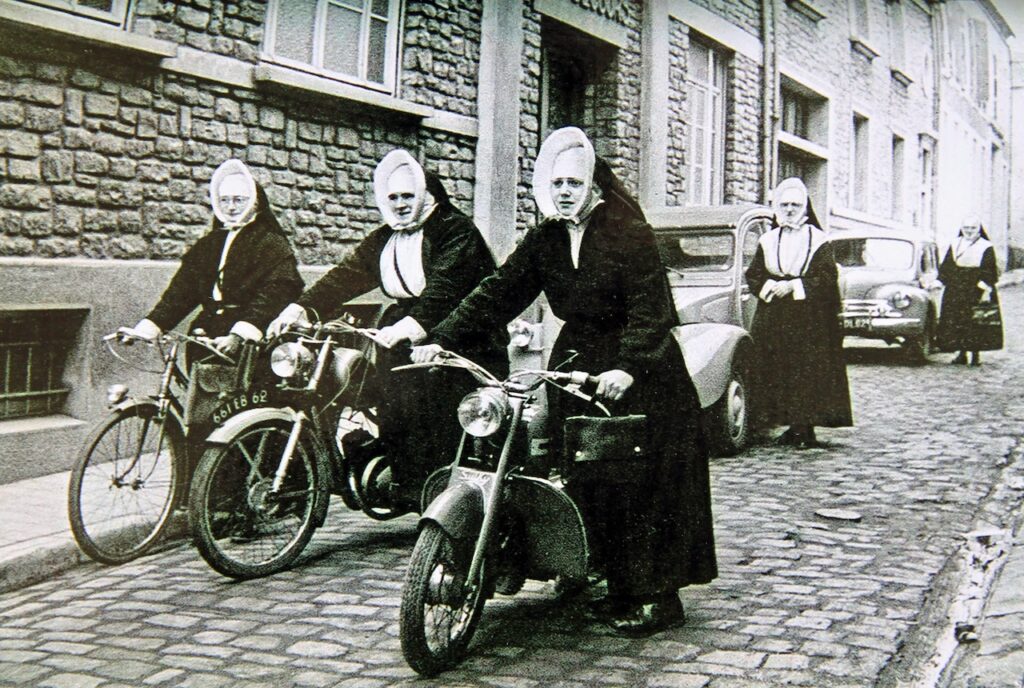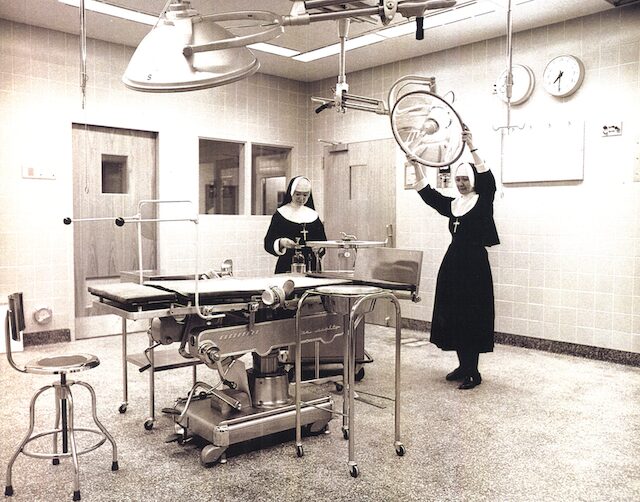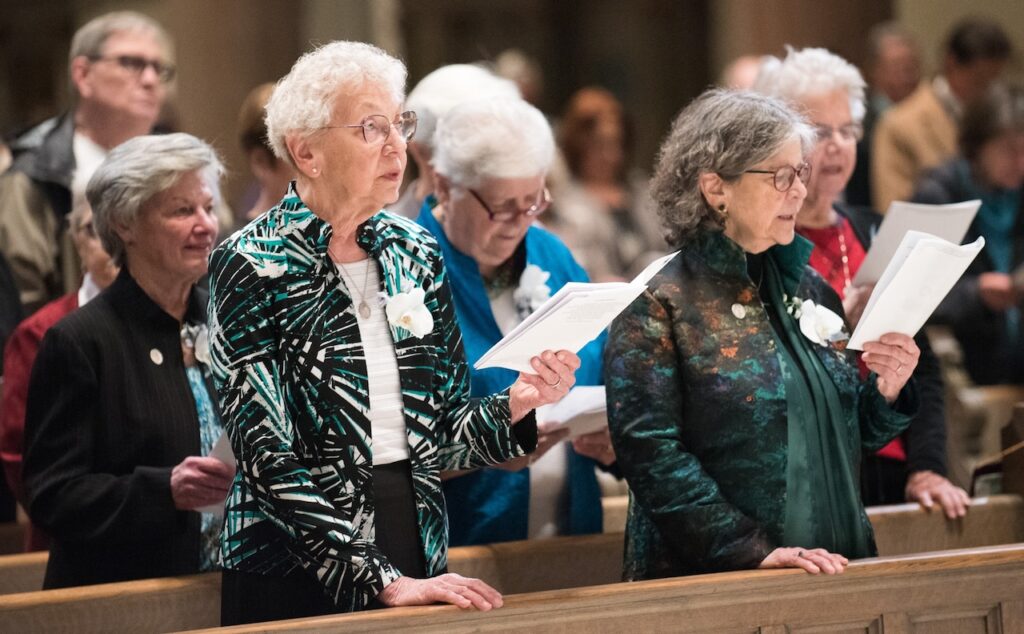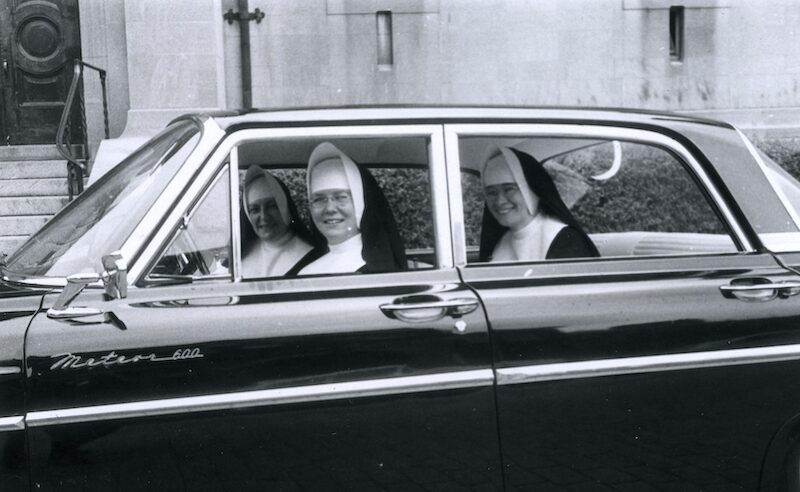The Congregation of Sisters of Bon Secours is celebrating 200 years of service this year. Over the past two centuries, CBS has become synonymous with good help, starting with a small, but mighty, congregation of sisters at its core.
While Bon Secours has long been a staple in the diocese, known especially for St. Mary’s Hospital, Richmond, the order was founded Jan. 24, 1824, in Paris, France, during a time of turmoil.
France was still reeling from the French Revolution, which had ended 25 years prior. During this time, people were suffering from tuberculosis, the plague, poor hygiene, starvation, and countless other problems.
They were also suffering from a crisis of faith, as many turned away from the Church. In response, twelve women joined together to form the Congregation of Sisters of Bon Secours (CBS). “Bon secours” means “good help” in French, and it began their own revolution.
Congregation Leader Sister Rose “Rosie” Marie Jasinski explained that, at the time, sisters were expected to stay in their convent at night for safety. But the sisters felt they were needed outside the convent. Healthcare was still rudimentary; many people were so afraid of hospitals that they refused to go, so these women would treat them in their homes.
While they couldn’t heal everyone, the sisters could comfort them. They also crossed the barricades to care for those on the other side; soldiers, revolutionists, peasants and nobles were all treated the same.
“The care of the patient became their prayer and their commitment,” said Sister Rosie. “This was a radical deviation from the expected at the time, and so was looked on with suspicion and criticism from some. It took about 50 years for the Church to officially recognize the new group as a religious congregation within the Catholic Church.”
Sister Fran Gorsuch added, “For those founding sisters, the pull toward compassion and a healing presence was so palpable … they were willing to risk suspicion and criticism … confident that keeping their hearts fixed on Jesus’ call would be their protection, their security, and their strength.”

Compassion, healing, liberation
The CBS website states the sisters spread compassion, healing and liberation around the world.
The order is credited with providing the world’s first formal home health care service. News of this small group of revolutionary sisters spread, and by the 1880s, the sisters came to the United States to help set up a health care ministry in Baltimore. In addition to home healthcare, they also established the first daycare facility in Baltimore in 1907 to help working mothers who would have otherwise had to place their children in orphanages.
As medicine advanced during the 20th century, the sisters began building and working in hospitals in order to help more people.
St. Mary’s Hospital has been serving Richmond since 1966, and CBS played a vital role in its establishment. Originally, the convent in Richmond was on the top floor of St. Mary’s because the sisters spent so much time working in the hospital.
Sister Elaine Davia has been with the congregation for 60 years. “When I was a senior in high school, I was talking to a priest friend who was helping to open St. Mary’s Hospital. He told me about the Sisters of Bon Secours,” she recalled.
“I knew God meant it to be,” she added. “God placed the Sisters of Bon Secours right in my lap.”
Sister Elaine worked as a nurse practitioner for 48 years and is now based in Baltimore. She helped set up traveling clinics in areas of Richmond and Portsmouth for people who lacked health insurance. She explained that while many of the sisters are nurses, “our gifts are much broader.”
Some sisters teach in poverty-stricken areas in Peru. In the United States, the order is involved in advocacy, working with asylum seekers who wish to escape their dangerous homelands. Sisters provide assistance to those facing eviction. They work with ex-offenders to keep them from going back to jail. In Baltimore, they opened a middle school for girls in high-crime neighborhoods. The list goes on and on.
“You can’t solve all the problems in the world, but a little at a time makes a difference,” said Sister Elaine.
Sister Patricia Eck is a Richmond native and has been with the congregation since 1966. Like Sister Rosie and Sister Elaine, Sister Pat was also trained as a nurse, though she went on to earn a master’s degree in health care administration and now is a member of the board of directors at Bon Secours Mercy Health. She also served as the former chief operations officer of St. Mary’s Hospital.
“That’s the beauty of health care. You can be in almost any field and find yourself at home in health care,” said Sister Pat. “We need accountants, businesspeople, administrators, as well as nurses.”

Adapting and expanding
Sister Pat said CBS has adapted for the past two centuries and continues to do so. Today, the mission involves volunteers and working lay men and women, as well.
Richmond and Baltimore have unique volunteer programs available for young adults. For one year, they commit to living with other volunteers and devoting their time to “justice in radical solidarity with the poor, the suffering, and those most in need.”
Members of the Bon Secours Volunteer Ministry help the unemployed find jobs and housing, work in mobile health clinics, assist teachers in local schools, advocate on behalf of patients, and serve their communities in other ways.
Associates are adults who do not take religious vows, but make a two-year commitment to live the same mission as CBS by providing “good help” in their families, workplace and community.
Andrew Burrichter is the vice president of Mission at Bon Secours Richmond and helped plan the 200th anniversary Mass. He explained how the legacy of the CBS is carried out today.
“Jesus, his work and his ministry – not only was there physical healing, but there was spiritual healing,” he said. “We recognize that and seek to extend the ministry of Jesus.”
Burrichter also stated that St. Mary’s Hospital offers spiritual care in a variety of ways. There are daily Masses, priests who offer sacraments to patients, and other chaplains on staff.
Bishop Barry C. Knestout offered an anniversary Mass Feb. 24 at the Cathedral of the Sacred Heart, Richmond.
During his homily, Bishop Knestout pointed out that the French word “secours” means “to rescue,” but when “bon” is added, the meaning changes to “good help.” The “help” can be small, like a story the bishop shared about receiving help from strangers while hiking a mountain in Ireland – or big, like when Jesus rescued all of us through his sacrifice.
Bishop Knestout closed his homily, commenting, “It is a sense of sacrifice for the greater good, which inspires the Bon Secours congregation and their good help.”
“My hope is that our charism of compassion, healing and liberation will continue to be lived out in all the countries where we are,” said Sister Rosie. “I am filled with gratitude for the blessings we have known and am filled with hope for our future, unknown though it may be.”

If you are interested in joining the Congregation of Sisters of Bon Secours, please visit https://bonsecours.us/vocations/ or https://bonsecours.us/volunteers/.

